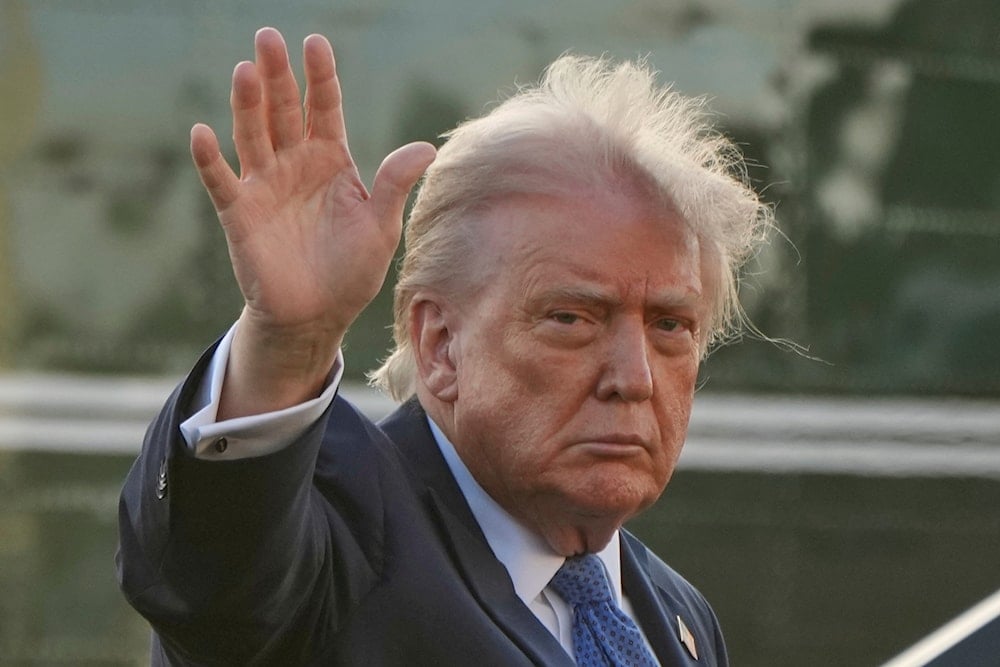Trump signs executive order to expedite deep-sea mining in US
US President Donald Trump advances deep-sea mining under an executive order, bypassing global rules to secure rare earth minerals, as China imposes export controls and warns of environmental harm.
 US President Donald Trump arrives at Leesburg Executive Airport on Marine One in Leesburg, Va., Thursday, April 24, 2025 (AP)
US President Donald Trump arrives at Leesburg Executive Airport on Marine One in Leesburg, Va., Thursday, April 24, 2025 (AP)
US President Donald Trump has disregarded international norms by pushing for the rapid expansion of deep-sea mining in both domestic and international waters, prompting Beijing to angrily condemn the move as a violation of international law.
Trump has issued an executive order to accelerate deep-sea mining operations, seeking to position the United States as a leader in extracting mineral-rich seabed resources. This move aims to bypass international regulatory frameworks and environmental safeguards, provoking sharp criticism from Beijing, which views the decision as a breach of international law.
White House officials argue that deep-sea mining could generate hundreds of billions of dollars for the US economy while countering China’s control over rare earth minerals. However, critics warn that the plan undermines the efforts of the International Seabed Authority, which has worked for decades to establish fair industry standards and protect marine ecosystems.
The United States, not a signatory to the treaty recognizing the Authority's jurisdiction over international seabeds, is invoking a 1980 law allowing the federal government to grant mining permits beyond national waters. Trump's executive order mandates that the commerce secretary fast-track permits for exploration and extraction, with a 60-day review period.
"No country should bypass the International Seabed Authority and international law and arbitrarily authorise exploration and development activities," Chinese foreign ministry spokesperson Guo Jiakun told AFP, emphasizing that "The US authorisation of exploration and exploitation of mineral resources on its so-called outer continental shelf violates international law and harms the overall interests of the international community."
Deep-sea mining causes ecological damage
Environmental groups have voiced strong opposition to Trump's push for rapid deep-sea mining, citing serious ecological risks. While commercial operations are still in early development stages, the US is aggressively expanding its capacity to harvest rare earth minerals vital for national security and high-tech industries, aiming to reduce dependence on China.
Experts caution that disrupting deep-sea ecosystems, which are among the least understood on Earth, could have irreversible consequences. Emily Jeffers from the Center for Biological Diversity warned that hastening into seabed mining risks an environmental catastrophe, threatening fragile marine habitats.
Amid these concerns, US-based company Impossible Metals has requested permission to begin mining in the Pacific Ocean near American Samoa, intensifying the debate over balancing resource security with environmental responsibility.
China controls US access to rare earths
On April 4, Beijing introduced new export controls on rare earth minerals in retaliation against US tariff policies. The restrictions affect elements critical to defense and medicine, including gadolinium, lutetium, yttrium, and terbium. These minerals are essential for technologies ranging from MRI imaging to advanced weapon systems.
China, which produced 70% of the world’s rare earth minerals in 2022, remains the dominant global supplier. The US, highly reliant on Chinese imports, accounting for 74% of its rare earth supply between 2018 and 2021, faces growing vulnerability amid tightening restrictions.
Polymetallic nodules, which resemble potato-sized pebbles and are found on the ocean floor at depths ranging from 13,000 to 20,000 feet (4,000 to 6,000 meters), contain valuable metals such as manganese, iron, cobalt, copper, and nickel, making them a critical seabed resource for industrial and technological applications.
While some US healthcare firms report stable supplies due to diversified sourcing, analysts warn of potential shortages if export curbs persist. Meanwhile, Washington is primarily concerned with national security, as rare earth minerals are indispensable for producing drones, radar, and missile guidance systems.

 4 Min Read
4 Min Read










